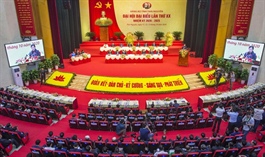Importance of connectivity in Vietnam’s economic recovery
Importance of connectivity in Vietnam’s economic recovery
The current pandemic has disrupted the daily lives of people around the world. In this landscape, ICT has been helping many cope with the lockdown. Denis Brunetti – president of Ericsson in Vietnam, Myanmar, Cambodia, and Laos – talks about the importance of connectivity, especially 5G, towards new innovation and economic growth.

Denis Brunetti – president of Ericsson in Vietnam, Myanmar, Cambodia, and Laos
|
Globally, time spent online has increased significantly with nine in 10 consumers claiming an increase in their usage of internet activities and one in five starting new online activities during the crisis, such as e-learning and video conferencing. The average time spent connected to 4G networks globally has seen an average increase of an hour a day. Today, connectivity is key and telecom networks have stood up to the test.
In the recent Consumer Lab Survey by Ericsson, 83 per cent of the survey respondents claimed that ICT helped them to cope with the lockdown. Faced with the sudden realities of social distancing and lockdowns, consumers and businesses view fast-connectivity as vital for coping with these tough economic times.
This has reinforced the role that resilient networks are playing in maintaining business continuity to support a quicker economic recovery. Three in four consumers today value network resilience and say internet connectivity is not only most critical during this crisis but also future crises.
Now more than ever before, the existing network platform is demonstrating its value as a highly secure foundation for both innovation and collaboration, across a wide range of industries. In research with Imperial College London, we proved that the deployment of mobile broadband networks spurs economic development. The results show, on average, that a 10 per cent increase in mobile broadband adoption ratio leads to a 0.8 per cent increase in GDP.
High-speed mobile connectivity like 5G will be instrumental in providing a stable platform for innovation and economic growth, not least when we factor in the big potential that is still untapped by unlocking ecosystems and digitalising our industry verticals such as the health sector, energy and utilities, transportation, and agriculture. The promise of 5G and Industry 4.0 includes creating jobs and improving and expanding access to health care. It will also help to reduce carbon emissions, improve education and raise the quality of life in cities around the world. Many countries would like to kickstart their economies with investments to drive new innovation.
The learning from the introduction of 4G indicates that early adopters of 5G technology are likely to enjoy industry leadership, just as the early adopters of 4G did. Investments in 5G infrastructure is an incredible opportunity for governments around the world and we believe that it will have a massive impact on economies.
The benefits of 5G investments will be experienced both by today’s workforce and by the workforce of the future, as we estimate that by 2030 two-thirds of the global workforce will use the 5G platform.
In the current situation, critical bottlenecks are arising in certain areas of expertise, particularly in the medical field. As a result, many people are seeing telemedicine in a new light. The ability to diagnose and monitor non-hospitalised patients remotely, instead of through physical visits to hospitals, has the advantage of keeping medical professionals and hospitalised patients safe and enables greater efficiency as more patients can be handled by each doctor/nurse.
Further, telemedicine enables physicians to provide consultations over video and audio. Just think of what multi-sensory communication combining augmented video with spatial audio and haptic/tactile feedback will do for the telemedicine of tomorrow. Another excellent example of how digitalisation is helping us maximise the use of critical human expertise during the pandemic is in the education sector. The ability to use digital collaboration tools over the network has made it possible for many schools and universities around the world to transition from traditional classroom teaching to live-video-enabled distance education with relative ease, in a very short period of time. The examples of telemedicine and remote teaching that we see today represent the first steps toward the Internet of Skills, where we can maximise the use of human expertise, enabled by the multi-sensory experience of the Internet of Senses.
We can see that innovators of all kinds are focusing their attention on solving the myriad of challenges that have been created or exacerbated by the pandemic. It is critically important to ensure that they have the ability to cooperate, collaborate, and share their ideas in order to achieve the breakthroughs we are all counting on. Thankfully, the network platform is ideal not only for innovation, but for collaboration as well. It is a foundation that has been built on the key values of openness, trust and security.
As in the case of 4G, 5G too will offer significant advantages to the early movers and there is merit in businesses and countries accelerating their move to 5G. As countries start easing out lockdowns and opening their borders for global trade once again, investing in the network of tomorrow will have a lasting and positive impact on businesses and their unique post-pandemic needs for a fast revival. Based on our technology leadership and experience with 5G deployments across the globe, we are in a good position to support Vietnam on its 5G journey.






















